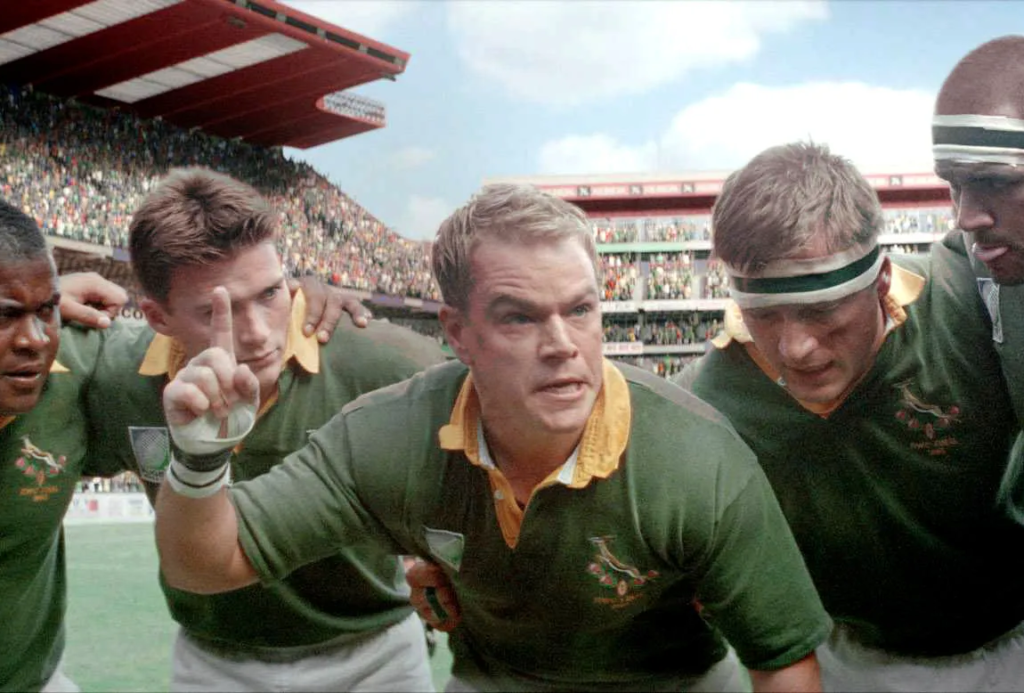Clint Eastwood’s old-school approach to filmmaking has never been more inexpressive than in Invictus, a shallow adaptation of John Carlin’s book, Playing the Enemy. The film spotlights newly-elected Nelson Mandela and his shrewd attempt to unify the nation of South Africa by backing the Springbok rugby team — at the time considered a symbol of the indignity many of the country’s Blacks citizens had endured — leading them to the 1995 World Cup. Eastwood filters this historical alliance through conventional dramatization, and the result is a maudlin rendition of one of the most exciting times in South African history. Morgan Freeman plays Mandela, and he does so with an uncanny grasp of the icon’s mannerisms: Mandela’s gravelly voice, the glint of optimism in his eyes, and the way he walks, a sign of his old age and the years of hardship he lived through. Eastwood didn’t think twice about handing the part of Mandela to Freeman, and the actor does mostly excel. However, Freeman’s loose grasp of the South African accent complicates things, occasionally making his work seem disingenuous or, worse, distracting. At one point in the film, Mandela is challenged with the question, “You’ve won an election, but can you run a country?” In a sense, a similar question could be directed at Freeman: he was chosen for this role by Mandela himself, but was he the right choice? In contrast, Matt Damon, as Springbok captain Francois Pienaar, succumbs to fewer accent slips, but he’s asked only to look the part, acting as a buffed-up set piece and given little opportunity to personify his character.
Eastwood’s handling of the many personalities and conflicts in this script creates problems throughout Invictus, as in his treatment of Mandela’s strained home life. Whereas writer Peter Morgan integrated the personal affairs of the titular monarch in The Queen both skillfully and compellingly, Eastwood and his screenwriter, Anthony Peckham, use similar scenes to merely kill time leading up to the film’s appropriately gripping climax. The problem with this approach is that Invictus is not a Nelson Mandela biopic. It’s a film about a specific moment and place in history, when a nation so extremely divided made strides to shrug off lasting prejudices through triumph and courage — finding both on the rugby field. Needless subplots, such as racially charged frictions between Mandela’s bodyguards, seem to serve no real purpose beyond filler. Are they meant to further reiterate the still rampant animosity between Black and white countrymen? If so, considering that Invictus takes place at the end of the Apartheid era, that animosity need not be so heavy-handedly emphasized.
Of course, one cannot expect such a rich and complex passage of history to be comprehensively told in just over two hours, but even still, the easily won resolution in Invictus does not ring true. Peckham’s all too simplistic screenplay turns much of this story into melodramatic speechifying and cliche. And for every moment of genuinely solid craftsmanship that Eastwood delivers — the rugby matches in particular are handsomely composed and kinetically exhilarating — there’s usually a nagging element to those scenes holding them back (not least of which being two really bad song choices that push key scenes into the saccharine). Worst of all, Clint makes no real effort to analyze and understand this story beyond its inspirational sheen, and because of this, the modest emotional resonance the film musters is short-lived. Central themes — those of morality, forgiveness. and tolerance — are laid out but explored in the most superficial and trite terms, often reduced to broad generalizations — black and white, as it were. In a sense, this flattening of more complex issues serves as a simplified dissertation for those unschooled in, say, the specifics of rugby or the intricacies of mid-’90s South African politics. But still, even the digestible elements of this story become grating, and Invictus begins to seem too light on real substance. The film’s title, translated, means “unconquered.” It’s a sadly appropriate irony given the immense struggle Eastwood has in handling this material.


Comments are closed.